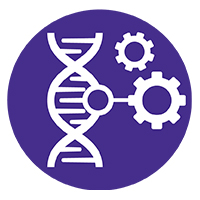Back
Advances in Therapeutic Development Across Modalities
Session: Rapid Fire: The Evolution of Cellular Therapy
Extending Blood Stability for Clinical ELISpot
Tuesday, April 25, 2023
2:45 PM – 3:00 PM ET
Location: Salon E, 5th Floor
.jpg)
Xinyuan Li, PhD
Senior Scientist
Janssen R&D
Lower Gwynedd Township, Pennsylvania, United States
Rapid Fire Speaker(s)
Cell and gene therapies have demonstrated impressive therapeutic efficacy in various human diseases. Nevertheless, the existence of cellular immune response towards these novel modalities remains a concern for achieving long-lasting clinical responses. It is thus imperative to develop robust assays to monitor clinical cellular immunogenicity towards these therapies. ELISpot assay has become the technique of choice for measuring cellular immunity response in clinical programs among other assay systems. All methodologies will require isolation of the prepared peripheral mononuclear cells from human blood, which quality is one of the most critical aspects for robust assessment of cellular immune responses. The optimized blood sample processing conditions, however, remain poorly understood.
In this study, we examined the impact of blood sample processing time on ELISpot assay performance. We found that for blood samples that are processed after 1-day delay, a loss of ELISpot signals occurs, which coincides with the reduction of CD4+ and CD8+ T-cell populations. We further optimized several parameters during sample processing, and successfully recovered ELISpot signals as well as CD4/CD8 expression on T cells for the blood samples that are processed within 32 hours. Our study provides an extension of sample processing window for clinical studies and is significant for addressing the logistical challenge of sample shipment from cell/gene therapy clinical studies.
In this study, we examined the impact of blood sample processing time on ELISpot assay performance. We found that for blood samples that are processed after 1-day delay, a loss of ELISpot signals occurs, which coincides with the reduction of CD4+ and CD8+ T-cell populations. We further optimized several parameters during sample processing, and successfully recovered ELISpot signals as well as CD4/CD8 expression on T cells for the blood samples that are processed within 32 hours. Our study provides an extension of sample processing window for clinical studies and is significant for addressing the logistical challenge of sample shipment from cell/gene therapy clinical studies.
Learning Objectives:
- Upon completion, participant will learn about ELISpot assay and how it is used in clinical studies.
- Upon completion, participant will be able to recognize the impact of blood sample preparation on clinical ELISpot assays.
- Upon completion, participant will learn how to develop robust ELISpot assays for clinical studies.

